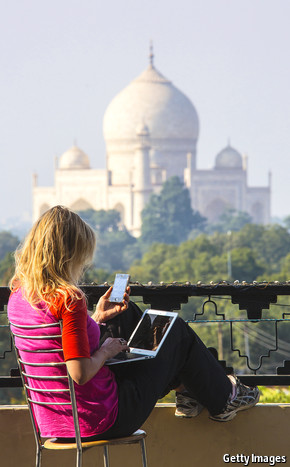1:47 AM David vs two Goliaths | ||||
#online travel agents # TripAdvisor could challenge the big two providers of online travel services
“BREAKFAST is nasty, the rooms are nasty.” So complained a reviewer of an Oregon guesthouse earlier this year. There is nothing unusual in that: all hotels must deal with the odd disgruntled guest. This critique, though, appeared on TripAdvisor, a travel-review website. When the correspondent went on to document drunken housekeepers and licentious receptionists, the owners sued him. It was more than a point of pride. What customers say on TripAdvisor can make or break hotels. Around 260m people visit the site each month to read some of the 125m reviews. The firm makes money by displaying prices from online travel-agents (OTAs) alongside its reviews, and then charging those agents each time a customer clicks through. It is such a good example of a network effect that it is the subject of a Harvard Business School (HBS) case study. The more users post reviews, the more useful the site is to those about to book a holiday. This makes it more important to hotels and travel agents, who offer better deals. This results in more traffic—and more reviews—closing the virtuous circle. Last year TripAdvisor reported revenue of $944.7m. Because users post reviews free of charge, in 2012, Jeffrey Bussgang, an HBS lecturer, calculated that its gross margin was an astounding 98%. In this section For these reasons, some think TripAdvisor may be able to take on the “big two” OTAs, Expedia (from which TripAdvisor was spun off in 2011) and Priceline, which on August 6th bought up to 10% of Ctrip, a large travel website in China. These firms sell flights and hotel rooms directly, rather than pass booking requests on to others, as TripAdvisor does. But, says Blake Harper of Wunderlich Securities, a stockbroker, the two ways of doing business are converging. Sites owned by the big two, such as Hotels.com and Booking.com, now encourage user reviews. At the same time, TripAdvisor has launched Instant Booking, which lets smartphone users complete their bookings without leaving the TripAdvisor site (although the transaction itself will still be with an OTA or a hotel). Instant Booking serves another purpose. Half of TripAdvisor’s traffic comes through mobile devices. Being able to book in a single place will make its app slicker. Moreover, smartphones are creating firms which cater to travellers when they arrive at their destination—and TripAdvisor is getting into that business. In May it paid a reported $140m for La Fourchette, an online restaurant-booking service. On 24th July it said it was paying $200m for Viator, a firm that sells guided tours and other touristy activities. TripAdvisor’s boss, Stephen Kaufer, denies he wants to take on the big two. “We are a media site,” he says. “I want Expedia and Priceline to thrive because they are my clients.” But soon, holidaymakers will be able to book their entire trips without leaving the TripAdvisor app. Rivals beware.
| ||||
|
| ||||
| Total comments: 0 | |
 Service poor, view disappointing
Service poor, view disappointing